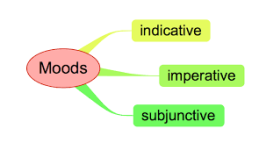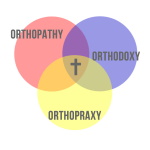Background
After decades of teaching and observing Christian practice in multiple cultures and denominations, theology professor Roger Olson reflected on his experience on his blog and asked: What Is the Essence of Christianity? His answer: orthodoxy (right belief: doctrines), orthopraxy (right living: ethics/morality), orthopathy (right experience: spirituality), and he thinks the most crucial is actually orthopathy for which he argues in part two.
Another blog article also highlights the same 3 terms as part of Sanctification defining them:
Orthodoxy is correct doctrine/teaching. The content is right.
Orthopraxy is correct living. The lifestyle is right.
Orthopathy is right emotional and/or affections.
and then discussing them within the indicative, imperative, and subjunctive framework:

C.SE and Spirituality related Questions
Does C.SE have good guidelines for these 3 areas?
- I think C.SE has excellent guidelines for good questions on doctrines, by scoping orthodoxy to denominations, where they truly belong. Denominations are also tightly linked to theological camps, which help a lot in scoping questions.
- Questions on morality are also handled adequately, but less satisfactorily, since there are a lot of overlap between theological camps, and the natural dividing line seems to be philosophical (divine command theory vs. natural law) which even influences exegesis. My (subjective) perception is that even in twenty-first century theologians from a theological camp that used to favor divine command theory (such as Calvinists) are appreciating more the natural law way of framing morality questions, although still a lot watered down compared to Catholic natural law practice.
- But when it comes to spirituality, what is the guideline for scoping, tagging, focusing, and objectivity?
I found that in the area of "spirituality" C.SE has comparatively a lot fewer questions than the other 2 areas. At this point, there are only 44 tagged spirituality and 23 tagged mysticism. The rest (216) seems to fall under a "catch all" tag christian-living but only a small subset have spirituality as a topic with the rest are mostly morality or cultural.
How to ask spirituality questions?
The question that prompts this meta question is What does it mean to "seek" and "find" God?. I think this is a perfectly valid question to obtain a good definition and a good criteria of how Christians frame all their religious activities, which in Roger Olson's dichotomy falls under orthopathy (right experience / spirituality). The fact that the Bible use the terms (see examples) should be enough reason for the question's validity.
But the question is currently under criticism for
- Need more focus ("does not focus on any particular denomination")
- Opinion based ("These are matters of personal experience, not of stated doctrine.")
Using that question as a test case, my question is what is the guideline for scoping, tagging, focusing, and objectivity so that questions on Christian experience can be asked on this site? Given that orthopathy (right experience) is important (see Roger Olson's argument) there is inherent objectivity (which is important for this site), otherwise "ortho" wouldn't make sense.
Mitigation for objectivity
Some ideas to provide stable definition of Christian experience / spirituality to discuss this topic more objectively:
- Use definitions from standard textbooks on Christian spirituality such as Protestant Alister McGrath's Christian Spirituality: An Introduction or Catholic Jordan Aumann's Christian Spirituality in the Catholic Tradition.
- Create good tag definitions that further divides
spiritualityto serve as scoping mechanism. For example,mysticismis a proper subset ofspirituality. - Consult websites such as gotquestions.org What is spiritual theology, wikipedia Catholic spirituality, etc.

